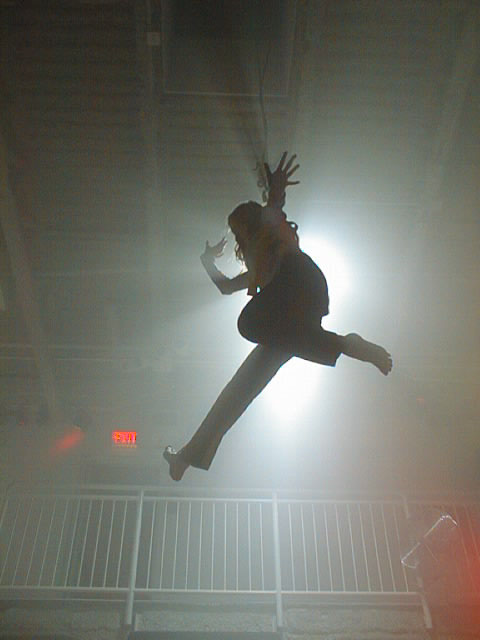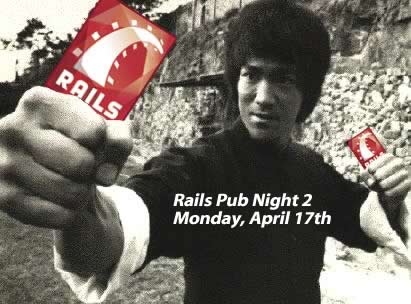
A wide-angle shot of the MaRS Centre, where the event was held.
I caught last night’s ICT Toronto gathering at the MaRS Centre, where ICT Toronto announced the release of their “cluster development strategy” paper — a plan to boost the competitiveness and standing of Accordion City’s information and communications technology sector over the next five years.

A close-up shot of the MaRS Centre entrance.

It was easy to spot the DemoCamp gang — me, David, Jay, Sutha, Bryce, Mark — among the attendees, who numbered around 100. We were the only people there not in suits. It certainly looked as though we were there only people there who wrote code for a living. We made sure to mingle and found that most of the attendees seemed to be from the management side of various information and communications tech firms or from organizations that invested in them.

The riff-raff! From left to right: David Crow, Sutha Kamal, Jay Goldman.
While waiting for the presentations to begin, we talked about how we could get some of the “suits” in the room to attend some of the upcoming events like Mesh, DemoCamp or BarCamp. Would these events hold any interest for them? I suggested that we “sell” the idea of such events to them as some kind of “walk on the wild side” tour. “What Burning Man is to us, DemoCamp and BarCamp could be to them!”

David enjoys a drink; Jay prays that nobody mistakes him for a bike courier.
In addition to my notes below, Mark Kuznicki and Rob Hyndman have posted blog entries about the event as well. The Globe and Mail has an article on ICT canada titled Toronto Aims to be High-Tech Hub and we have yet to see if the National Post is going to take a break from their “Oil! Oil! Yeah, baby, we got the Prime Minister and the oil! Suck it, Eastern Canada!” binge long enough to notice.

The strategy proposed by ICT Toronto boils down to these four points:
- Increase collaboration between education, industry and government in the field of information and communications technologies.
- Increase the profile of the information and communcations technology sector.
- Increase the competetitiveness of our information and communications technology businesses.
- Retain and attract information and communications technology businesses.
They presented an executive summary of the strategy paper after the presentations, and the full paper is now available for download [600K PDF].
A Couple of Videos of the Crowd
Notes from the Speakers

Here are my notes from the presentation. The first speaker was Accordion City mayor David Miller, followed by three speakers from the ICT Toronto working group, followed by a question-and-answer session.
Mayor David Miller
- The MaRS Centre is a symbol of of what Toronto can do with technology,
and by extension information technology.
- MaRS is the only research centre of its type located in a downtown
location, and a prime one at that. It’s across the street from
a world-class university across the street, some of the world’s best
research hospitals just down the street, a short walk from the most
respected financial institutions in the world, plus Toronto Hydro —
who are setting up the city with WiFi across University avenue.
- We should be comparing ourselves to the world’s great cities.
- Toronto is a world leader in mining finance — our competitors are
cities like London! We need to think of ourselves in the ICT cluster
in the same way.
- On a business developement mission to New York City, Miller sold
the virtues of Toronto to businesses there. Their responose at the
end: “We didn’t know that about Toronto.” Toronto needs to sell itself
better: “The only thing we haven’t done is tell our story.”
- Our goal: Make Toronto the 5th leading ICT sector in the world.
David Ticoll
His presentation: “Toronto’s ICT Industry in a Global Context”
Some statistics:
| Canada’s workforce, c. 2001 | 15.4 million |
| Toronto’s workforce, c. 2001 | 2.4 million |
| Canada’s ICT and related workforce, c. 2001 | 580,000 |
| Toronto’s ICT and related workforce, c. 2001 | 133,000 |
| Service occupations facing global competition | 80+ |
| Affected workers in Canada | 2.4 million |
| Affected workers in Toronto (guesstimate) | 550,000 |
| Canada’s world rank as exporter of business services in 1995 | 6 |
| Canada’s world rank as exporter of business services in 2002 | 13 |
On Offshoring
- We’re not keeping up in the use of offshoring.
- It is both a problem and a competitive advantage
- If you offshore, you send away jobsm but if you don’t…
- You don’t lower labour costs
- You lose the ability to do certain things that would otherwise
be prohibitively expensive
- Offshoring is a competitive challenge with ambiguity
On India
- Showed a photo of an oxcart in the middle of automobile
traffic. The oxcart is delivering materials for the construction
of a superhighway. That’s their challenge — their infrastructure for
the infrastructure is a mix of modern and archaic.
- Showed a photo of the Accenture campus in Mumbai. “There are about
5,000 Accenture employees in Canada. There are 18,000 in India right
now.” Accenture’s goal is to have 50,000 in India in 3 years.
- Accenture seems to follow a pattern. They recently bought a Wall
Street firm, moved it to Toronto for about 6 months to make it
operational, and then transported it to India.
- Offshoring will be a $110 billion industry by 2010
- India’s potential share, should they “stay the course”: $60 billion
- If India takes an “innovation” strategy, their potential share could
be as high as $70 to $80 billion
- The Indian government is a very well-educated group who understand
technology. India’s president is a rocket scientist…literally!
- They’re pushing for innovation; not just “predictable work”
- Promod
Haque (Norwest Venture Partners) is working on a US/India
joint arrangement to create a “Bell Labs” in India”
- The arrangement would be to do bleeding edge R&D with the US doing
the “R” and India doing the “D”.
- The US would invest $500 billion
- India’s strengths:
- Strong national strategy, with government and industry working
together
- Culture of winning
- Continuous learning and questioning
- Strategic thinking
- Strong domestic industry
- Articulate, knowledgable government leadership
- Strong national strategy, with government and industry working
- India’s weaknesses:
- Infrastructure
- Other emerging countries moving into the same business
- Things we need to ask:
- What should go offshore to make our businesses more
competitive?
- How do these deals yield competitive gains?
- How do we prepare our young people for the job landscape of the
future? (It seems to favour well-rounded people over those with
someone with a narrow skill set.)
- What about geopolitical plays — such as the proposed US/India
deal? This sort of thing isn’t on the radar of the federal
government with their “5 priorities”.
- What should go offshore to make our businesses more
- Things we need to do:
- Embrace productivity-enhancing business investments
- Foster domestic exportable knowledge-based services
- Partner with government
- Compete and constantly rethink strategy
- Remember Andy Grove’s motto: “Only the paranoid survive”
Ron Friedman
- ICT Toronto is concetrating on these sectors:
- Computer and telecommunications manufacturing
- Software development
- IT and telecom services
- New media
- Toronto ICT stats:
- 3rd largest ICT city in North America — only surpassed by
the San Francisco Bay Area and New York City
- 3300 ICT companies in the Toronto region
- These companies have a total of 148000 employees
- They generate $30 – 35 billion annually
- They generate $6 billion in exports
- ICT is the fifth largest employment category in Toronto
- 3rd largest ICT city in North America — only surpassed by
- There is a lack of political recognition of the importance of the
ICT sector
- Toronto has a high level of entrepreneurship
- The vision: for Toronto be be recongized as one of top 5 ICT
centres in the world by 2011
- The plan:
- Establish ICT Toronto as a central point of contact for the
world
- Bring people together to do business
- Link ICT and key economic centres
- Build professional development centres and business mentoring
services for the entrepreneurial community
- Advocate for federal or provincial research institute
in the Toronto region (Toronto lacks federal/prov-funded
ICT research organizations
- Ensure that TO’s wireless infrastructure is leading-edge
internationally — assess future bandwidth and wireless needs
and make sure that we have world-leading WiFi users to match
- Implement an international marketing communications action plan
- Establish ICT Toronto as a central point of contact for the
Frank Maw
- Canada:
- Currently experiencing a bout of prosperity
- But: there are unprecedented levels of displacement in labour —
manfacturing, agricultural, forestry and fishing are going to
emerging economies
- China graduates more engineers annually than all the North American
engineering students and profesisonal engineers put together
- When it comes to information and computer technologies, Toronto is
3rd in North America
- Among the qualities that make Toronto attractive to high-tech
companies:
- World-class universities
- A rich city culture with lots to do and cultural diversity
- A creative class and “bohemian charm”
- According to KPMG, Canada is the most competitive of the G8 nations
- Why did we set the goal to be in the top 5 tech cities in the world
by 2011?
- To create large and growing stream of jobs for our kids and
grandkids
- Generate incremental tax revenue at the local, provincial and
federal levels
- To boost other business segments
- Because ICT is a market segment with “currency”
- To improve our quality of life and standard of living
- To create large and growing stream of jobs for our kids and
- We won’t compete on cost, but quality
- There needs to be political will at all 3 levels of government
Points Raised During the Q & A Session

- There are about 40,000 people in Canada who are doing
“nearshoring” work
- We haven’t done an assessment of what Canada’s real assets are
- The big ICT challenge: finding good, affordable management
- Our strength: initial innovation – pre-commoditization
- Structural problem in canadian ICT industry — large and medium sized players are foreign-owned, which makes it hard for the presdient of a Canadian branch office to promote Canada
- Toronto’s current ranking in world — “Embarrassingly, we don’t know”. We know that we’re number 3 in North America, but don’t know the world ranking. Currently looking into that.
- Areas for early attention:
- Fusion between financial industry / IT
- Digital media world — partnered with San Francisco — creating centres of excellence
- ICT accounts for 42% of R&D spending in the private sector but only 2% of R&D spending at Canada’s universities.









